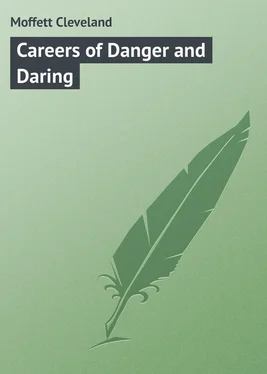Cleveland Moffett - Careers of Danger and Daring
Здесь есть возможность читать онлайн «Cleveland Moffett - Careers of Danger and Daring» — ознакомительный отрывок электронной книги совершенно бесплатно, а после прочтения отрывка купить полную версию. В некоторых случаях можно слушать аудио, скачать через торрент в формате fb2 и присутствует краткое содержание. Жанр: foreign_prose, на английском языке. Описание произведения, (предисловие) а так же отзывы посетителей доступны на портале библиотеки ЛибКат.
- Название:Careers of Danger and Daring
- Автор:
- Жанр:
- Год:неизвестен
- ISBN:нет данных
- Рейтинг книги:4 / 5. Голосов: 1
-
Избранное:Добавить в избранное
- Отзывы:
-
Ваша оценка:
- 80
- 1
- 2
- 3
- 4
- 5
Careers of Danger and Daring: краткое содержание, описание и аннотация
Предлагаем к чтению аннотацию, описание, краткое содержание или предисловие (зависит от того, что написал сам автор книги «Careers of Danger and Daring»). Если вы не нашли необходимую информацию о книге — напишите в комментариях, мы постараемся отыскать её.
Careers of Danger and Daring — читать онлайн ознакомительный отрывок
Ниже представлен текст книги, разбитый по страницам. Система сохранения места последней прочитанной страницы, позволяет с удобством читать онлайн бесплатно книгу «Careers of Danger and Daring», без необходимости каждый раз заново искать на чём Вы остановились. Поставьте закладку, и сможете в любой момент перейти на страницу, на которой закончили чтение.
Интервал:
Закладка:
The fact is, though I did not know it, my friends up in the daylight were pumping me down too much air (this in their eager desire to give enough), and I was in danger of becoming more buoyant than is good for a diver; in fact, if the clay-pipe gentleman had turned his wheel just a shade faster I should have traveled up in a rush – four hundred pounds and all. I learned afterward that Atkinson had an experience like this, one day, when a green tender mixed the signals and kept sending down more air every time he got a jerk for less. Atkinson was under a vessel's keel, patching a hole, and he hung on there as long as he could, saying things to himself, while the suit swelled and swelled. Then he let go, and came to the surface so fast that he shot three feet out of the water, and startled the poor tender into dropping his line and taking to his heels.
Needless to say, that sort of thing is quite the reverse of amusing to a diver, who must be raised and lowered slowly (say at the speed of a lazy freight elevator) to escape bad head-pains from changing air-pressure.
I sat down on the deck and took note of things. The golden color of the water was due to the sunshine through it and the mud in it – a fine effect from a mean cause. For two or three feet I could see distinctly enough. I noticed how red my hands were from the squeeze of rubber wrist-bands. I felt the diving-suit over, and found the legs pressed hard against my body with the weight of water. I searched for the hammer and nail they had tied to me, and proceeded to drive the latter into the deck. I knew that divers use tools under water – the hammer, the saw, the crowbar, etc. – almost entirely by sense of feeling, and I wanted to see if I could do so. The thing proved easier than I had expected. I hit the nail on the head nearly every time. Nor did the water resistance matter much; my nail went home, and I was duly pleased. I breathed quicker, after this slight exertion, and recalled Atkinson's words about the great fatigue of work under water.
I stood up again and shuffled to the edge of the wreck. Strange to think that if I stepped off I should fall to the bottom (unless the life-line held me) just as surely as a man might fall to the ground from a housetop. I would not rise as a swimmer does. And then I felt the diver's utter helplessness: he cannot lift himself; he cannot speak; he cannot save himself, except as those lines save him. Let them part, let one of them choke, and he dies instantly.
And now the steady braying of the air-pump beat sounded like cries of distress, and the noise in my ears grew like the roar of a train. All divers below hear this roaring, and it keeps them from any talking one with another: when two are down together, they communicate by taps and jerks, as they do with the tenders above. I bent my head back, and could see a stream of bubbles, large ones, rising, rising from the escape-valve like a ladder of glistening pearls. And clinging to my little windows were myriad tiny bubbles that rose slowly. The old Hackensack was boiling all about me, and I saw how there may well be reason in the belief of some that this ceaseless ebullition from the helmet (often accompanied by a phosphorescent light in the bubbles) is the diver's safeguard against creatures of the deep.
Well, I had had my experience, and all had gone well – a delightful experience, a thing distinctly worth the doing. It was time to feel for the life-line and give the three slow pulls. Where was the ladder now? I was a little uncertain, and understood how easily a diver (even old-timers have this trouble) may lose his bearings. There! one, two, three. And the answer comes straightway down the line – one, two, three. That means I must stand ready; they are about to lift me. Now the rope tightens under my arms, and easily, slowly, I rise, rise, and the golden water pales to silver, the bubbles boil faster, and I come to the surface by the ladder's side and grope again for its rungs. How heavy I have suddenly become without the river to buoy me! This climbing the ladder is the hardest task of all; it is like carrying two men on one's back. Again I bend over the deck, and see hands moving at my windows. A twist, a tug, and off comes the face-glass, with a suck of air. The test is over.
"You done well," is the greeting I receive; and the divers welcome me almost as one of their craft. Henceforth I have friends among these quiet men whose business it is to look danger in the eye (and look they do without flinching) as they fare over river and sea, and under river and sea, in search of wrecks.
THE BALLOONIST
I
HERE WE VISIT A BALLOON FARM AND TALK, WITH THE MAN WHO RUNS IT
I NEVER knew a man who has been so many things (and been them all fairly well) as has Carl Myers of Frankfort, New York. They call him "Professor" Myers ever since he took to ballooning, years ago; but they might call him Dr. Myers, for he has studied medicine, or Wrestler Myers, for he is skilled in all tricks of assault and defense, Japanese and others, or Banker Myers, for he spent years in financial dealings, or Printer Myers, for he still sets up his own type, or Telegrapher Myers, or Lecturer Myers, or Carpenter Myers, or Photographer Myers.
All these callings (and some others) Myers has pursued with eagerness and success, only making a change when driven to it by his thirst for varied knowledge and his guiding principle, "I refuse to let this world bore me." To-day the professor is sixty years old (a thin, wiry, sharp-eyed little man), yet I suspect some boys of sixteen who read these pages feel older than he does. You ought to hear him laugh! or tell about the air-ship that has carried him over thirteen States! or describe his "balloon farm" at Frankfort! I don't know when I have enjoyed myself more than during three days Professor Myers spent with me some time ago.
Suppose we begin with the balloon farm, which is certainly a queer place. It is a joke in the neighborhood that the professor plants his balloon crop in the spring, gathers it in the fall, and stores it away through the winter. Certain it is that in summer-time the visitor (and visitors come in swarms) sees fields marked off in rows with stakes and cross-poles, on which balloon-cloth by hundreds of yards seems to be growing (really, it is drying); and other fields, that look like an Eskimo village, with houses of crinkly yellowish stuff (really, half-inflated balloons); and groups of men boiling varnish in great kettles which are always getting on fire and may explode; and other men working nimbly at the knitting of nets; and others experimenting with parachutes; and the professor paddling away at the height of three thousand feet for his afternoon "skycycle" sail; and Mme. Carlotta, the celebrated aëronaut (also the professor's wife), making an ascension now and then from the front lawn in a chosen one of her twenty-odd balloons.
And in winter, should you explore the upper rooms of the house, you would find all the balloons tucked away snugly in cocoons, as it were, fast asleep, ranged along the attic floor, each under its net, each ticketed with a record of its work, marked for good or bad conduct after it has been tested by master or mistress.
For weeks at a time in the experiment season a captive balloon hovers above the Frankfort farm, say twelve hundred feet up, and the tricks they play with that balloon would draw all the boys in the country, if their parents would let them go. Three guy-ropes hold the balloon steady like legs of an enormous tripod, and straight down from the netting a fourth rope hangs free. Now, imagine swinging on a rope twelve hundred feet long! They do that often for tests of flying-machines or aëroplanes – swing off the housetop, and sail away in a long, slow curve, just clearing the ground, and land on top of a windmill at the far side of the grounds. That's a swing worth talking about! And fancy a man hitched fast to this rope by shoulder-straps, and as he swings flapping a pair of great wings made of feathers and silk, and trying to steer with a ridiculous spreading tail of the same materials. The professor had a visit from such a man, who had spent years and a fortune in contriving this flying device, which, alas! would never fly.
Читать дальшеИнтервал:
Закладка:
Похожие книги на «Careers of Danger and Daring»
Представляем Вашему вниманию похожие книги на «Careers of Danger and Daring» списком для выбора. Мы отобрали схожую по названию и смыслу литературу в надежде предоставить читателям больше вариантов отыскать новые, интересные, ещё непрочитанные произведения.
Обсуждение, отзывы о книге «Careers of Danger and Daring» и просто собственные мнения читателей. Оставьте ваши комментарии, напишите, что Вы думаете о произведении, его смысле или главных героях. Укажите что конкретно понравилось, а что нет, и почему Вы так считаете.












